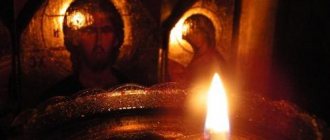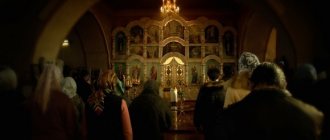What is Lent
One of the main holidays in the Christian world is Easter Sunday.
This day, according to the Christian religion, is a symbol of goodness and rebirth. But at the same time, all believers know what tragic events preceded this Bright Day. That is why the pre-holiday period, which is known to everyone as Great Lent, is filled with abstinence and reflection, which contributes to the purification of the soul. Of all the Orthodox fasts, Great Lent is the longest. Its duration is seven weeks. The most significant is the last week, which is called “Holy Week”. At this time, believers should observe strict rules regarding nutrition and behavior. It is believed that this period, if all requirements are met, opens a stairway to heaven for Christians.
In order to properly go through the period of Lent, not to succumb to temptations and excesses, you need to take into account important points:
- You should clearly understand what Great Lent is. To do this, you must first study special religious literature. It should be understood that fasting is not only about changes in diet. The main thing is to conquer yourself and learn to control all your actions. Overcoming sin means overcoming your passions and shortcomings.
- It is definitely recommended to talk to your priest before starting Lent. A priest can help you get in the right mood and give useful advice.
The entire history of Lent is based on the following principles:
- The spirit rules over the flesh and rules over physical needs. It is important to control your weaknesses and learn to deny yourself them.
- Quitting bad habits, in particular alcohol and smoking.
- Strictly monitor your own emotions, actions, words and thoughts.
- Fill your soul with goodwill and tolerance towards people around you, get rid of evil and resentment.
First week of Lent: advice from pastors
The first week of Lent is a time of special prayer and strict abstinence. In the first four days - from Monday to Thursday - the Penitential Canon of St. Andrew of Crete will be read in almost all churches.
Lenten service in the Sretensky Monastery. Photo: M. Rodionov / Pravoslavie.Ru
Most active Christians today live in cities. The metropolis leaves its mark on our spiritual life. The townspeople are immersed in many everyday concerns: they work, study, are always in a hurry somewhere... Some, under the influence of various circumstances, do not find the strength and opportunity to take part in all Lenten services. The Pravoslavie.ru portal asked the pastors to say a few words about the main thing that, in their opinion, should fill the life of a Christian during the days of Lent, to suggest something from personal experience, to help troubled Christians determine a spiritual program - maximum and minimum - during these days.
***
Hegumen Nektariy (Morozov), rector of the temple in honor of the icon of the Mother of God “Quench my sorrows” in Saratov:
– Our life is like a dream. The world draws us in, lulls us to sleep - we live day after day, not noticing what is happening in our soul, where we are moving, how healthy, or more precisely, how sick our “inner man” is. The enemy also lulls us to sleep: as soon as we wake up and worry, he begins to insinuatingly reassure us: “Yes, we need to change something, fix it, and you will definitely do it, but not now, but then, later...”.
And often from this lull, from this state of false tranquility, we are brought out only by some serious test - illness, grief, for which we are not ready. And for some, such an awakening is death...
Great Lent is the time when we can shake off the shackles of sleep, the time when we can rise spiritually by hearing again the kontakion of the Great Canon: “My soul, rise, whatever you say, the end is approaching...”. This is the time when we can force ourselves to stop, interrupt the endless daily run, look into our own hearts, understand how far we are from God, from the ideal to which He, without stopping, calls us...
This is the time when heaven opens for us, the time when the pain of repentance can most strongly hurt our soul and force it to again seek that freedom from sin and passions that can heal this pain. And the Lord these days is so close to every repentant...
And so little is needed from us!
Just break free, come to the temple in the evening and allow your soul, like the thirsty earth for rain, to absorb the words of the Cretan shepherd. And decide to do what she - the awakening and reviving soul - will demand from us more and more insistently. Archpriest Igor Shestakov, head of the youth department of the Chelyabinsk diocese, rector of the Holy Trinity Church in Chelyabinsk, member of the Public Chamber of the Chelyabinsk region, head of the military-patriotic club “Warrior”:
- In the first days of Lent you feel especially special, you get inspired, you forget about vanity, peace, warmth in your heart. I remember my first “Lenten experience,” neophyte and chaotic, like everyone else who comes to the Church, probably. I felt the harmony and severity of the Lenten service precisely in the first week, reading the kathisma in the choir, praying every evening at the reading of the Great Penitential Canon, at the Liturgy of the Presanctified Gifts. I had no idea about the existence of these services, going to the church for several months, but having “become acquainted” with them, I was forever confirmed in the opinion that these are the most solemn and magnificent services of the entire annual circle.
Now, having already served the altar of the Lord for two decades, I look forward to the Lenten chants, the canon of St. Andrew of Crete, the Trisongs and the prayers of St. Ephraim the Syrian. Someone will say: “What else should a priest do?” And someone will cry out: “We have no time to pray and fast, all this long reading and singing is difficult and difficult for us to understand, we live with the problems of today, we are tired and irritated, and leave us with your fast, we have nothing to eat anyway!” What to say? Slide into the rhetoric of mentoring, which is little perceived even by the church-going audience? Or remind the people that they are “ignorant of the law”?
Our trouble is that we do not look at the very essence of fasting as an act of free will and love for God. In general, we talk very little about free will, freedom in truth and love, unjustifiably little! We must feel the need
fast, we must
want
to fast in repentance, humility and abstinence, without reproaching those who behave differently on these holy days. Then suddenly the words of the chants and prayers addressed to us will become clear. You can feel like a spiritual person by taking up arms and fighting against idleness, despondency, covetousness and idle talk. Against laziness and lethargy of the soul. Against fatness and weakened spirit. This is a passionate action, and only those who want to be a Christian, not in name, but in deeds, decide to take it on. Here we need all our Christian courage and our will. And if this is not so, then it means that we put up with our enslavement to habits, inclinations and passions and do not dare to challenge them.
Fasting today is an open challenge to hedonistic morality, consumerism, spiritual indifference, and selfishness.
This is a battle, a struggle, a test of the strength of our faith, the firmness of our hope, the strength of our love. Which of us wants to be a fighter and a good warrior of Christ? Enter these open church doors and become among those whose spirit is awake and rejoices in the life-giving holy day of Pentecost! Archpriest Vasily Mazur, rector of the Sergius Church at the regional hospital in Kherson, associate professor of the Department of Ecology and Geography of Kherson State University:
- Lent is a great gift of God for the salvation of our souls. Its first week is the sowing of virtues, the entire post is their patient and careful cultivation. The last week is the gathering of fruits, and the holiday of Easter is the time of eating the fruits from bodily and spiritual labors incurred during fasting.
You cannot become perfect in one post, but you can and should move closer to perfection at least one step during each post. Fasting in food is within the power of every Christian, but the degree of severity varies. One measure is for monks and clergy, the other is for laity. The ability to fast comes with time from post to post.
Fasting should not become a source of quarrels in the family, when one of the spouses has not yet come to the need to fast, but the other sincerely desires it. Fasting should bring joy, not sadness. Prayer during Lent, combined with meekness and patience, can take marital relationships to a whole new level.
Attending Lenten services, so touching and touching, is not so much a duty as a need of a repentant soul.
But, of course, there should be no conflicts because of this, either at work or at home. Archpriest Andrei Tkachev, rector of the Church of St. Agapit of Pechersk in Kiev:
- All believers, no matter how many there are, cannot fast in exactly the same way - due to their differences in age, health, lifestyle, and degree of church involvement. And the eras that succeed one another leave their characteristic stamp on spiritual life, turning the same spiritual work not into a repetition of what happened before, but into something completely unique and special.
What are the modern features of the Lenten feat?
The first thing that catches your eye is the time that an ordinary person spends on moving today. To get to work, and after work to go to church and then return home, a person has to not just cross the street or walk a couple of hundred meters, but make the usual and long journeys. This is an exhausting pastime in city transport, it is a daily waste of energy and pocket money. In the best case, it takes an hour to get to work, an hour from work to church, and an hour from work to home. A total of three hours of hard and specific “work”, drawing out the remnants of physical and mental strength from a person.
Meanwhile, the Church Charter is not designed for such movements. It is designed for a monastery, where from the cell to the place of obedience is a stone's throw, and from the place of obedience to the temple is a five-minute walk. Hence the opportunity to have several hours of time and a reserve of strength for long prayer work in the temple. Rural life also presupposes proximity to home, temple and place of work. Here is the field, here is the house, and here is the sound of a nearby bell, calling for service. In addition, the communal life of the monastery assumes that a person returning from service will find ready-made food in the refectory, even the most modest for the sake of fasting, but still ready. And a worldly pilgrim (usually a woman) will be forced, upon arriving home, to stand at the stove and feed his household. As you can see, the feat doubles and even triples.
We cannot change living conditions in a radical way. But we can change our attitude towards them. In this case, the confessors are required to be sensitive and compassionate to the “little parishioner” who is struggling for life, exhausted from a tough life and trying to serve God. He doesn’t read everything, he doesn’t stand through everything, he doesn’t listen to everything. And from what he listens and reads, he does not understand everything. Patience and forbearance are needed. Raising the bar of demands and the gloomy look of an expert teaching an ignoramus are unacceptable. You need to understand that the enemy of morning prayer is haste, and the enemy of evening prayer is fatigue. And a person may have to learn prayers and psalms by heart in order to lean against the window in a subway car and pray from memory. One cannot reproach him for this way of prayer; rather, on the contrary, one should encourage and console him.
Another necessary remark regarding the era with its features is the shift in emphasis from food to information. The man of previous eras was healthier and more resilient than our contemporary. He needed an empty stomach to reduce biological activity. It was necessary to really weaken in order to contain my violent passion. Modern man is quite often a dead man and a real weakness. He does not suffer from excess physical strength and does not move mountains. On the contrary, he wakes up tired and barely moves his legs during the day. But he is overfed, stuffed with information that pours into his eyes and ears like tropical rain, making many look like patients in a psychiatric clinic who for some reason spend the night at home.
Turning off the TV and not turning it on at least during the first week, the Week of the Cross and Holy Week will be much more useful than examining the labels on products: they say, is there powdered milk or anything else that is not lean. Music, gossip and idle chatter, TV shows, “hanging out” on your favorite sites - these are things more dangerous than a glass of milk, and require a more strict or even merciless attitude towards yourself.
Of course, I am not in favor of a person joining an “information post” and continuing to eat whatever he wants. Bodily abstinence, as the fathers said, is truly “the mother of all good things.” You need to dry your belly and give out alms, you need to practice reading the Holy Scriptures and kneeling. But we need to understand the peculiarities of the world in which we live, and not try, as St. Philaret of Moscow said, to turn Moscow into Thebaid, and the nineteenth century into the fifth century. And Philaret’s contemporary, no less wonderful in life and in mind, Saint Ignatius, repeated the words like a commandment: “Understand the time.”
A drunken, devoid of reasoning attitude to life breeds mistakes at every step and discredits the very possibility of leading a “quiet and silent life in all piety and purity.”
So, you can’t throw one yardstick at everyone, but deal with each person as an “individual case.” It is impossible not to take into account the actual bustle of cities with their distances, movement, and fatigue. And one cannot help but remember that fasting and prayer are the mental work of the inner man, which means that the enemy of this work is an excess of information even more than an excess of food calories.
What follows will be dictated by experience, because the road is mastered by the one who walks, and not by the one who studies the map of the route.
Hieromonk Macarius (Markish), head of the communications service of the Ivanovo-Voznesensk diocese:
– What should be the main thing during the days of fasting? The answer, from experience – the church’s and my own – should be in “relative” terms, and not in absolute ones. Do not demand from a person: eat this, read such and such prayers, go to church at such and such a time, but offer the following:
– the whole family (if there is one) determine the food order for children and adults for the entire period of Lent (for example, sweets only on Saturdays and Sundays, etc.) and ask the priest to bless the observance of this order;
– also determine the order in which you watch TV (from limited to completely turned off);
– increase the duration of personal (family) prayers;
– set a time for personal or family reading of Orthodox literature, _suitable for everyone;
– set a time to come to church on weekdays, prepare to participate in Lenten services (find the texts of the Canon of Penitence, Compline, the Liturgy of the Presanctified Gifts, the services of Holy Week);
– help each other (tactfully, unobtrusively) prepare more carefully and seriously for confession, confess several times during fasting and, if possible, partake of the holy mysteries;
– also, with the help of loved ones or on your own, set and solve any specific moral tasks (get rid of a particular habit, for example, smoking, visit someone who needs your help, make tangible donations to a cause, etc. .P.).
What you shouldn’t do: make vows “for fasting” to abstain from some sin or bad habit: if it’s a sin, then you need to get rid of it forever
.
So, for example, if you have a “problem” with alcohol and vow not to drink during Lent, this means that you will look forward to drinking for seven weeks and will greet Easter like a pig. Archpriest Sergiy Vishnyakov, dean of the Obninsk district of the Kaluga diocese, director of spiritual and educational:
- The most important thing for a Christian during Lent is to spend these days very carefully. This is a period of intense work on your internal state. Both abstinence in food and prayer are only the conditions under which our goal - cleansing the soul - is achieved. If possible, you need to come to the temple to pray. It is especially good to listen to the canon of St. Andrew of Crete, which with the depth of repentant thoughts has a very strong effect on the heart and mind. If this is not possible, then there is no need to despair.
It is good to avoid external manifestations of your feat, not to make a downcast face during fasting, etc. Be friendly and calm. At the same time, try to be meek so that no negativity comes from you. One of the signs of incorrect fasting is irritability and anger. And it often manifests itself, especially when there is a struggle between the old and the new man. Therefore, attention (sobriety) is the core around which the entire life of a spiritual person is built. And during fasting, it is imperative to closely observe ourselves: what we say, what we listen to, where we look, what our heart’s thoughts are about. It is most important. It is necessary to understand that Lent is not just some segment of our life’s journey, but an image of our entire life - this is what the holy fathers taught.
While working on yourself, you need to figure out what torments your conscience more, what interferes with your life, what we want to get rid of. And try to make every effort to achieve this through fasting, repentance and prayer.
On the other hand, of course, the duration of fasting resembles a kind of tithe of the year, which we give to God, that is, it is a sacrifice to God. This is where you need to sacrifice. Let’s say a person has an attachment that seems innocent at first glance: he likes to crack seeds. Completely lean food, but it would be good to try to learn abstinence in small things, because, according to the words of the Apostle Paul, “nothing should possess me” (1 Cor. 6:12). Or, for example, try to abstain from sweets during fasting. Not to mention the fact that it is necessary to refrain from television, excessive communication, telephone conversations, communication on Internet forums and other activities that contribute to distraction.
And in a metropolis a person is quite capable of maintaining sobriety. In the first volume of the works of St. Ignatius (Brianchaninov) there is even a chapter “The Order of one who pays attention to oneself, living in the middle of the world” - about how to save yourself in a big city, with what thoughts to get up, with what to go to bed, how to behave during the day. A Christian is not one who is isolated. If he’s a monk, then that’s a different matter, but we live in the world. Orthodox laity should differ from other people in their spiritual life. We pray: “Lord, hallowed be thy name.” The name is sanctified not only there, in heaven, but in us, so that people, looking at us, glorify our Heavenly Father and want to live as the Church teaches. This is what it means to love God. We should not all live the same way, but each one should live according to the measure of his faith, in accordance with the conditions of his life.
As for abstaining from food, everything is individual: fast as you can, but forcing yourself to abstain. For one it will be enough to abstain from meat, for the second it will be enough to fast more strictly, and for the third it is necessary to abstain from food altogether. A simple principle: “all things are lawful for me, but not all things are profitable” (1 Cor. 6:12).
Pride has two extremes: either everything or nothing. But the proud cannot follow the middle path. Everything should be in moderation so that our body does not interfere with our mind from praying. This is the main principle.
Let's return to our first point - attention.
There is no need to take on feats beyond your strength in this first week. Fasting is relaxed for the sick, students, and pregnant women. Excessive fatigue of the body by fasting is just as harmful as overeating. How can you pray if you are already falling, your legs are giving way in prayer from exhaustion? Experience from church history: already the ancient ascetics realized that, it turns out, it is easier to fast than to fight thoughts, it is easier to sleep on earth than to forgive. And since those times, the attitude towards asceticism and working on oneself has changed.
If a woman sits at home with her children and cannot come to church for the canon of St. Andrew of Crete, then she can read this canon at home (there are enough books now), even at night, as our pious grandmothers did.
And the most important thing during fasting is not to isolate yourself, but to try to correct yourself.
You shouldn't engage in self-criticism. We are far from perfect, we can see things in ourselves that will make our minds fly, so we need to quickly get rid of what we see in ourselves through confession. Otherwise, despair and despondency will overwhelm you if you only consider your sins. Outwardly we should be welcoming and friendly. Remember that we are children of our Heavenly Father. Priest Pavel Gumerov, cleric of the Church of St. Nicholas at the Rogozhskoe cemetery in Moscow:
- When I studied at the seminary, the songs of Hieromonk Roman (Matyushin) were very popular in our Bursat community. Now I remember a line from one of his songs: “Fasting with prayer will warm the soul, / The ringing of bells above the earth...”
During the first and Holy Weeks of Lent, classes at the seminary are closed so that all students can pray during the Lenten service every morning and evening, immersing themselves in spiritual life. It cannot be said that it was very easy: the fasting services are very long, and they do not exempt me from labor obediences during the first week, but I have the brightest memories of this time. After all, even the parish priest usually does not serve the entire first week, morning and evening, every day.
Of course, not every layman has such a unique opportunity to spend this grace-filled time entirely in prayer: everyone has work, worries, urgent matters and studies. But all Orthodox Christians need to slow down the crazy rush of everyday life during Lent and free up time for the soul.
After all, “fasting and prayer will warm the soul,” she, the poor one, is chilly in the modern cold world, sad and lonely in it. And in church during the service we warm up, as if we straighten up. Lent is also called “the spring of the soul,” and it is no coincidence that the most important fast is always in the spring. Nature is freed from snow and cold and blossoms. And our soul should bloom with fasting. So fasting is not a sad time, but a joyful one, of course, if we fast correctly and are properly tuned in to fasting. The great teacher of fasting, St. Ephraim the Syrian, says: “The glutton calls fasting a time of weeping, but the abstinent one does not look sad even in fasting.” What joy and benefit can be obtained by listening to the canon of St. Andrew of Crete in church, praying during the evening service!
A book with a parallel translation into Russian and with commentaries really helped me understand the meaning of this great work. I think that such a brochure can be easily purchased in church stores. You can take it with you directly to the service. The Great Canon is generally a storehouse of spiritual wisdom, and simply by reading it carefully, you can repeat and remember the entire Bible.
In almost all churches, the Great Canon usually begins at 18:00, so that people have time to go to church after work. But there are situations when there is no way to be in church all evenings. For example, inappropriate work schedules or caring for infants interfere. Then it will be very useful and good to read the canon at home. When the children were very small, my wife could not always go to the canon and read it with the children herself.
How to fast correctly? Don't limit yourself to just physical fasting. It’s completely empty not to eat sausage and frankfurters and at the same time not limit yourself to the usual comforts (TV, computer, newspapers, magazines, etc.). The result is hypocrisy - an external form without content. Not only the body, but the soul must fast. Now I don’t have a TV, but before, when I did, I would stop watching it during fasting and was simply amazed at how much free time was freed up. For example, during fasting you can usually read more books than in the whole year and do a bunch of things.
You need to pay special attention to the first week. She, like a tuning fork, sets the tone for the entire post. The first week, with its severity, helps you get into the rhythm of fasting and get off to the right start. So, when starting a long swim or race, you need to take your breath correctly. Then it will not be difficult to go the entire distance.
May the Lord grant that the coming fast will be favorable for us, help us to look deep into ourselves, become better, and cope with our sins.
Let us fast with a “pleasant fast”! Priest Dimitry Shishkin, cleric of the Church of the Three Hierarchs in Simferopol:
- Fasting is a time of conscious effort that helps us acquire other things in and
The division of the world is what the Lord calls the Kingdom of God within us.
It is known that the Greek word “metanoia” - “repentance”, literally means “change of consciousness”. A person is called to transform his own life; it is no coincidence that the Gospel sermon of Jesus Christ begins with the words: “Repent, for the Kingdom of Heaven is at hand” (Matthew 4:17) .
But sometimes we do not fully understand what repentance is. It seems to us that this is a brief event in inner life, a moment of contrition for sins, followed by days of everyday life and familiar routine. Of course, such “sudden” repentance is a gift from God, and it can change the structure of a person’s soul. But we can also understand repentance as the path of gradual, patient transformation of life. And this path is impossible without fasting.
This is what is important to understand: fasting is not only and not even so much abstinence from fast food. There are people who do not eat meat at all, there are those who abstain from food for the sake of physical beauty, and there are also those who eat sparingly due to the meager means. The latter usually say: “Oh, my whole life is a continuous fast!” But here’s the thing: fasting is a voluntary abstinence from everything that prevents a person from getting closer to God, and this is not meat, of course, but our passions, only one of which is gluttony. We are captivated by things that we often simply do not pay attention to. For some, turning off the TV for a couple of months, stopping playing computer games or listening to music is a feat no less, and maybe even greater, than giving up meat. And everyone has their own weaknesses and passions, which not only relax the soul, but tie it to the earth. The soul loses the taste of spiritual life and becomes, so to speak, “carnal.” She gets used to a variety of cozy sweets and in these sweets she loses the memory of herself and her heavenly calling.
Usually, at the beginning of Lent, people bring long “scrolls” of sins copied from books of repentance to confession. But besides such a lengthy confession, it would be good for everyone to identify several of their
sins are what especially hinders one from approaching God. It could be anger or a tendency to judge, idle talk... Everyone has their own. By noting these sins and paying special attention to them, you can, with God’s help, begin to fight them.
Any fight against sin begins with attention to yourself, to your inner life. When the Lord calls us to “keep watch” (Mark 13:37), we are talking about this heartfelt attention. Satan manifests itself in a person through sinful movements in the soul, called addictions. If a person is attentive to himself and knows what he intends to fight, then he will not miss these moments of outbreaks of sinful thoughts and feelings in the soul. And then the real war begins. You need to resolutely reject these excuses, disagree with them, say in your soul: it’s not I who think so, but you, Satan; get away from me! Moreover, the stronger the “attack” of sinful thoughts and feelings, the more attentive and diligent the prayer should be. In such strong passions as anger, fornication, pride, everything happens very quickly, in a split second the soul is inflamed with a sinful feeling. The holy righteous John of Kronstadt advises: “Contrast the speed of the enemy attack with the speed of your mental and heartfelt view of God, do not for a moment allow yourself to be carried away by his deception, but look to the Lord.” At such moments there is no room for reasoning, you just need to pray, and a short prayer is best, for example, “Lord, have mercy!”, which can be repeated many times. In general, when the soul is inflamed by a sinful feeling or during a storm of sinful thoughts, one must completely surrender oneself into the hands of God.
Often, under the attack of sinful thoughts and feelings, a person becomes despondent. But you need to know that in the very appearance of excuses in the soul, no matter how crazy and vile they may be, there is still no sin. This is how Satan works on the soul. And if a person resolutely rejects this abomination, there is no sin, no matter how long this violence against the soul continues and no matter how ferocious it is. This internal warfare is necessary for the purification of the soul, for confirmation in faith, and is available to a person wherever he is: at home, at work or on the street.
Surprisingly, failures and defeats in this struggle also bring undoubted benefits to a person, namely: they allow him to experience his weakness, to come to a contrite and humble state of spirit, when a person understands that without God he truly cannot create anything.
Thus, the soul gradually develops the skill of actively combating sin.
This struggle is difficult, but without it the meaning of fasting is lost: the transformation of the soul, the acquisition of grace, the achievement of unity with God. Priest Georgy Kazantsev, secretary of the missionary commission of the Kaluga diocese, confessor of the Kaluga Orthodox Missionary Society, administrator of the volunteer service “Mercy”:
- The meaning of any fast is self-restraint, that is, voluntary renunciation of what constitutes a noticeable part of our earthly sensual life. And in this sense, the first week is no different from the rest. Its importance lies in the fact that it is a time of transition - getting used to - to the fasting regime, so you can carry it out more strictly than the entire fast, so that it will be easier to fast later. But the measure of severity, after consulting with the confessor, everyone must determine for himself. Zeal for the feat of fasting must be combined with humble consideration of the extent of our capabilities. From the combination of jealousy and reasoning, our own measure must be born. You can’t rely on fashion or neighbors’ advice here. Naturally, we must focus on the requirements of the charter and not allow ourselves to relax frivolously, arbitrarily relaxing the fast allegedly due to the impossibility of fulfilling the statutory requirements. Nowadays it is fashionable to cut yourself some slack and talk about the impossibility of a full-fledged fast for our weak forces. If you a priori perceive the post with such an attitude, then nothing will happen. If you ask God for help, so that He allows you to go through the field of fasting successfully with reasoning, then everything will work out. Finding your measure of abstinence is one of the most important spiritual tasks of Lent.
It is important to limit exposure to information (TV, Internet) during fasting. Often such abstinence becomes more difficult than food restriction. As for our worries, we often multiply them for ourselves. You can safely forget about some of them during Lent.
And the most important thing, as I believe, is to set yourself a task during Lent - to overcome any specific, even small, sin.
Without this, the post will be in vain. You can set yourself a reading program for Lent. For example, read some part of the Holy Scripture, some book from the ascetic works of the holy fathers, for example, the Monk Abba Dorotheos, St. Ignatius (Brianchaninov) or St. Theophan the Recluse. Lent should be a time of initiation into the reading of patristic literature. Priest Vladimir Voitov, cleric of the Church of the Nativity of Christ in Obninsk:
– With the inner spirit we begin any business, we will continue it with this. It’s the same with fasting: with what mood you entered into fasting, you will most likely spend it in the same spirit. This means that the first week of fasting must be treated especially responsibly. The Typikon prescribes complete non-eating during the first two days of Lent. However, our Typikon came from the ancient monastery of St. Savva the Sanctified, which had the strictest rules, therefore I believe that such a strict rule is unacceptable for the laity. Once I asked the Old Believers: “How many days do you not eat during the first week of Lent?” “One day,” they answered. They even reduced this rule, although they strictly adhere to the letter of the charter. By the way, I know several Orthodox Christians who, during the first week, do not eat anything at all until Saturday. All week the “ascetics” have been walking around “green”; their psyche, one might say, is “at zero.” By the end of Friday they were already staggering with the wind from exhaustion... I am against this practice. According to the prediction of the ancient fathers and the general opinion of the holy fathers of recent times, extreme ascetic feats have been taken away from us, modern Orthodox Christians, due to our infection with pride. Such “extreme” feats will not benefit us, but will only fuel pride: “I’m not like everyone else!..” It’s very difficult to get rid of this feeling.
What rules should you take? The first thing you need to start with is to categorically refuse television and the Internet (except for work) for the entire Lent, until Easter. Only the Orthodox channel “Soyuz” is allowed - that’s what it was created for.
Second: it is necessary to refuse to visit guests - in principle, for the entire Lent, because there will definitely be temptations at a party: not only food, but also in the form of laughter and jokes. My position is this: we must not hesitate, but tell those inviting openly that now is the time of Great Lent, the saddest of all four fasts, because it is directly dedicated to the suffering of Christ, the Sacrifice of the Cross, for which God became incarnate in the world; For the sake of the suffering of Christ, we fast, abstaining from ourselves; The entire Orthodox world is fasting, and we are with it, so we won’t go on a visit...
In general, we Russian people tend to go to extremes. Just as some people don’t eat anything during the week, others, apparently strong, normal parishioners, come up from the very first day of fasting and, complaining of gastritis, say: “Allow the fast to be relaxed.” - "What would you like?" - “Eat meat or milk.” I know several people with stomach ulcers who observe Lent. And they say that this does not harm their health at all, and they even feel better.
For pregnant, nursing mothers, children, the elderly and the sick, the fast is weakened, down to zero. For those who do hard physical work, there should also be concessions. A person should feel: if there is exhaustion, mockery of his body, then he must, after consulting with a priest, reconsider his Lenten diet.
Fasting should not lead to a state of despondency or sadness. “Let us fast a pleasant fast,” it is sung in the stichera. Pleasant not in the sense of food, but in the sense of a beneficial effect on the soul, and if this is not so, then you need to change your fast.
Fasting is an exercise in abstinence, a small ascetic task that we can undertake. Exercise in abstinence fosters sobriety, that is, attention to oneself, the ability to restrain oneself, manage one’s emotions and feelings.
It is very useful to read patristic literature every day during Lent (the works of St. Ignatius (Brianchaninov) are best). Set a standard for yourself: one page or 10 pages. This reading refreshes the soul.
The maximum prayer program for the first week is to go to all services in the morning and evening.
In general, it is necessary for a layman, taking into account his life circumstances, to attend services at his own discretion. Everyone has their own measure of exercise in abstinence, so it is necessary to take into account age, soreness, and the severity of your work. It’s good to take a small separate additional rule in the middle of the day for Lent, or at least for its first week, for example, 30 Jesus prayers and five prostrations, but do this rule exactly as the holy fathers teach: slowly, carefully and with reverence. Why in the middle of the day? Because in the morning and evening we always pray at home or in church, but in the middle of the day we are most caught up in the bustle. It must be broken by turning to God: spend just a few minutes and calmly pray this short Jesus Prayer. This remembrance of God, restoration of connection with Him, repentance before Him will certainly give the peace of Christ to our soul. Anyone who has tried to do this knows what benefits it brings.
What prayers are read before the start of Lent?
Before the beginning of Lent, you can read prayers of a wide variety of directions. It is important to choose those prayer appeals that are closest in spirit to a particular believer.
Repentance prayers
Before Lent, it is recommended to read prayers of repentance. The essence of prayer requests of this type is that the believer turns to the Lord with a request to forgive him all sins in life, known and unknown. The importance of such prayers before Great Lent is explained by the fact that by praying, a person prepares for the cleansing of the soul, which, if all the rules are followed, will occur in the period before Easter.
It is important to remember that the effectiveness of prayers of repentance is inextricably linked to their repeated repetition. Therefore, due to the busyness of modern people, short prayer appeals should be used.
For example, you can use the following text:
“I, the Servant of God (my own name), know and understand that I am in the hands of Your, Almighty, great mercy. With this understanding, I entrust to You, my God, my soul and body, control my actions, feelings and words. Only You can see my entire life, my outcome, only you understand the torment of my soul, you see what awaits me on the path of life, You see my death and the day of rest of my body and soul. Show your great mercy to me, Great Lover of Humanity. Forgive me for the malice that remains in the corners of my soul, cleanse my soul from unkind feelings and thoughts. I repent of all the bad things I have done and sincerely pray for forgiveness. Help me, Lord, correct my life, guide me on the righteous path. Grant me every opportunity to live in accordance with the commandments of God, avoid temptations and distance myself from my enemies. I glorify Your Holy Name. Amen"
Prayer confession
Before Great Lent, all people are advised to read the prayer of confession. Very often, a prayer appeal is read before the prayer of repentance. It can be read in any form.
This prayer appeal is very personal, after it there is always relief. It is very difficult to give an example of a prayer-confession, because it should express the most intimate.
Prayer blessing
As a rule, prayers of blessing are read before Lent by a mother who blesses her children. The importance of such appeals is difficult to overestimate. The main principle of such prayer is to create a protective barrier around the child. Such protection will not allow you to get into unpleasant life situations and will allow you to guide your child along the righteous path and live according to the commandments of God.
The prayer can be said in your own words, but you can also use the following text:
“Lord Jesus Christ, Son of God, hear me, Thy sinful and unworthy servant. Save and preserve my children, guide them along the righteous path. Forgive all their sins, voluntary and involuntary, help them to do only good deeds. Enlighten, Lord, my children with your light, for the salvation of the soul and the healing of the body. Bless my children, Lord, on their life path everywhere: in study, in work, and on the road. Protect your children from all the dangers they will encounter along the way in life. Amen".
What prayers are customary to read during Lent?
During Lent, it is important to engage in spiritual cleansing every day. To do this, you should lead a righteous lifestyle, read the Bible and pray. Almost every day of Lent has its own prayers. But, of course, on any day and in any place it is recommended to read the “Our Father” prayer, known to all believers, which is very effective and will help to cope with any difficulties.
During the Nativity Fast (Philippo)
The tradition of the Nativity Fast has come from time immemorial. But only if fasting is accompanied by prayers that contain words of repentance for sins committed, can it fulfill its religious function. In addition, prayers during Lent will help a believer to cleanse himself spiritually.
Every evening before going to bed, the following prayer must be read:
“Eternal and merciful Lord, the Most High and Almighty, forgive me, the Servant of God (s) (my own name), the sins that I have committed, knowingly and unknownly, in deed, words or thought. Grant, God, to my humble soul cleansing from various external filth. Grant me, Almighty, a peaceful night's sleep, so that tomorrow I will again serve Your Holy Name. I ask you, Lord, to deliver me from the vanity of the day and dashing thoughts. Amen".
During Lent
During Great Lent, the prayer of Ephraim the Syrian is read every day, except weekends, including the Wednesday of Holy Week.
It should be read in the original and it reads as follows:
For a prayer to be understandable, you need to understand its meaning.
First, a request is made to protect the believer from various sins:
- The spirit of idleness refers to wasting time. This emphasizes that each person has his own natural talents and skills, and they need to be properly used for good. According to religious statements, idleness is the source of all sins.
- When a person is subject to despondency, he loses the ability to notice goodness and happiness in the life around him. He is able to plunge into darkness and become a real pessimist. Therefore, in order to go in the right direction and get closer to God, you need to get rid of despondency.
- The inner desire to control other people is naturally present in every person. But this is a sin that needs to be gotten rid of, as it can become a serious problem for the full development of a believer and an obstacle to sincere communication with God.
- Man is the only creature of God that has the ability to speak. But very often he uses words to insult and curse, which is already a great sin. The prayer asks for protection from useless and evil words.
Other prayers are also used during Lent. Your spiritual mentor can tell you which prayer requests are right for you. But you should definitely add the prayer of Ephraim the Syrian to them.
Peter's Fast (Apostolic)
Petrov Fast is one of the famous summer fasts. It begins 7 days after the celebration of Trinity and prepares Christians for the day of remembrance of the holy apostles Peter and Paul, which is celebrated on July 12. Its duration varies and depends on the time when Easter is celebrated.
During this period, prayers are read before each meal and after finishing the meal. In the first case, as a rule, the well-known prayer “Our Father” is read.
And at the end of breakfast, lunch or dinner, the following prayer is said:
“I thank You, Jesus Christ, our Lord, for satisfying those living on earth with food, for not depriving us of earthly blessings, and for giving us hope for the Kingdom of Heaven. Come to us and save us. Amen".
Dormition post
The Dormition Fast requires physical and spiritual abstinence. Therefore, you need to strictly follow the recommendations for limited nutrition and minimize various entertainment activities during this period. Before eating, you should definitely read the well-known prayer “Our Father”. You should also be sure to thank the Lord after your meal. This can be done with the traditional prayer given above.
But you can also simply say this phrase:
“An angel for your meal.”
Since this fast pays special attention to moderate nutrition, you should periodically say a prayer that will help you avoid excessive eating.
It sounds like this:
“I pray to You, All-Merciful and All-Loving Lord, deliver me from satiety, do not let me get carried away by voluptuousness. Grant me the opportunity to accept generous gifts with reverence and taste them only to strengthen my mental and physical strength. So that I can serve You, Lord, and glorify You. Amen".
One-day posts
One-day fasts should be observed every Wednesday and Friday throughout the year.
Such one-day posts are associated with the following events:
- On Wednesday Judas betrayed our Lord Jesus Christ;
- On Friday, Jesus Christ was crucified on the cross.
These days you should try to visit the temple and read the famous prayers of praise and gratitude there.
Daily prayers for Lent
Prayers during Lent should be said daily. There are a variety of texts for this, but you should put your own soul into them and it is allowed to modify the text without changing the overall meaning.
Prayer before starting a task
Before starting any business, you should ask for God’s blessing, this can be expressed in these words: “Heavenly King, hear the servant of God (your own name), come and dwell in my soul, cleanse it from all filth. Bless me, a sinner and unworthy, and help me successfully complete my work. I fall before Your icon and pray for goodness. Amen".
Prayer for humility and forgiveness of sins
You should definitely say a prayer during Lent for humility and forgiveness of sins. Thanks to it, you can more correctly tune in to all the demands of the pre-Easter period. Having gotten rid of all extraneous thoughts, you need to say the following words:
“Lord God, All-Merciful and Almighty, You know that only You are the real Savior for me. Help me, do not let me sin before You. Do not let me perish in sins, for I am weak; do not let my enemies harm me. Grant me humility and forgive me, Lord, all my sins. You are my real strength and hope. Thanks to You is immeasurable forever and ever. Amen"
Prayer for Gluttony
Prayer against gluttony will allow you to abstain from food. This condition is very important for cleansing the soul during Lent.
The prayer appeal goes like this:
“Lord, All-Powerful and All-Merciful, hear the servant of God (proper name), help me cleanse myself from the filth of gluttony. Grant me, God, to know the sweetness of abstaining from food. Let me enjoy the prayers addressed to You. Amen"
Prayer for cleansing the soul and body
Since all prayers during Lent should help cleanse the soul and body.
Therefore, the following daily prayer is important:
“Lord, I ask forgiveness from all those whom I, wittingly or unwittingly, offended. May this cleanse my soul and fill it with kindness and joy. Amen"
How to Fast with Faith and Prayer
In fact, it is absolutely not difficult for a believer to endure Great Lent in accordance with the requirements. Prayers during Lent and sincere faith in the soul effectively help with this.
It is important to be positive during this period. It should be remembered that any day must begin with prayer. In addition, at any convenient time it is necessary to offer a prayer appeal to God. But this should not be done in passing, but in solitude, renouncing all extraneous thoughts.
You should definitely attend services in the temple. It is important to understand that giving up food in combination with prayer will change your life, harmonizing it.
Prayer of Ephraim the Syrian
There are a lot of prayers that a layman can read on the 1st day of Lent, but special attention should be paid to the prayer of Ephraim the Syrian. This amazing prayer is read daily (except Saturday and Sunday); it is believed that it was first said by the great righteous man, Saint Ephraim the Syrian. The prayer is considered one of the most famous prayers of Lent.
The text of the prayer must be read verbatim. At first, you can read by looking at the text, but it is best to immediately memorize this prayer. This prayer is very powerful and must be approached sincerely and with respect.
This prayer is read twice after the Lenten service from Monday to Friday. It is not read on the last two days of the week, since on these days the services are not held as usual.
In the first reading of the prayer of Ephraim the Syrian, it is necessary to bow to the ground after each individual request. After this, they mentally read the prayer “God, cleanse me, a sinner,” twelve times and bow at the waist. Then they read the entire prayer again and make one prostration.
Many lay people wonder why this prayer is given such great importance during Lenten services. The thing is that it lists all the negative and positive elements of repentance in a special, amazing way. This, so to speak, will determine the list of deeds of each believer.
During the first week of Lent, special prayers are offered and strict abstinence is observed. Almost all temples and churches read the penitential canon of St. Andrew of Crete from Monday to Thursday. More details here:









